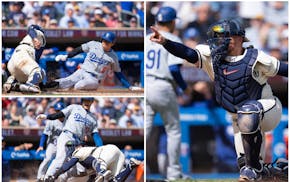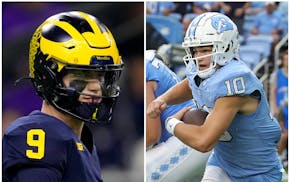Brian Dozier led the Twins in home runs last season with 18. He's on pace to finish first in that statistical category again this season.
That's not exactly a positive reflection of the Twins' ability to hit the ball a long way. Only four teams in the majors have fewer home runs than these feeble-swinging Twins, though the return of Oswaldo Arcia and Josh Willingham from injury should result in an uptick.
Dozier released some frustration after he missed an opportunity to drive a pitch in the eighth inning of a 5-4 loss to Texas on Thursday. He described himself as "big-eyed" on a two-strike pitch.
"I missed a really good pitch to hit really hard," he said.
Dozier's power supply has become a revelation because he's modest in stature (5-11, 190 pounds) and didn't display this kind of pop as a minor league prospect. Yet he is tied with the great Robinson Cano for most home runs — 29 — by a major league second baseman since the start of last season.
How, exactly?
"Lower half," hitting coach Tom Brunansky said. "He's strong."
Dozier's explanation revolves around a specific date and conversation that, he says, changed everything about his approach to hitting and helped establish him as an everyday player.
Dozier's development has altered the perception of him and his future. He now looks like a fixture in the lineup for years to come and possibly a future All-Star. Not coincidentally, he's also emerged as a leader on a team starved for someone to embrace that role.
Dozier traces the roots of his transformation to late May last year in Detroit when he and Brunansky sat at a computer and dissected his hitting mechanics.
Dozier had holes in his swing and was scuffling at the plate. He entered that Detroit series batting .206 with a slugging percentage of .286 and .536 OPS. At that point, he seemed destined for another demotion to the minors.
"It was kind of breaking point for me," Dozier said. "I knew I had to change something. It's a game of adjustments and if you can't do that, you might as well hang 'em up."
Dozier said he and Brunansky "revamped everything" with his mechanics, specifically the importance of him getting his foot down. Brunansky noted that Dozier sacrificed strength because he wasn't getting his foot planted.
"When he would land, he felt that he was down when his toe was down but his heel was never really down on the ground," Brunansky said. "That meant that when he would go to swing, he'd lose a lot of his lower half. I said you've got to get that anchored down."
The payoff from that adjustment is reflected in Dozier's production. Since that Detroit series last season, Dozier has batted .255 with a .455 slugging percentage and .795 OPS. He also has 28 home runs in that span.
"Ever since then, it's been night and day," Dozier said.
That kind of technical adjustment is why hitting a baseball remains a complicated science. One seemingly subtle flaw can throw everything out of whack.
"Everything we talk about as a hitter, it feels like it's Grand Canyon deep," Brunansky said. "That's how big it feels to us, whether we make a minor adjustment with our hands or our stride or any little adjustment."
Dozier doesn't pretend to be a finished product as a hitter. He needs to cut down on his strikeouts and raise his batting average (.243) to become more consistent at the plate. As he demonstrated Thursday, he's still capable of becoming saucer-eyed at the sight of a juicy pitch.
He's a gamer, though, which is something this organization desperately needs more of. There is nothing blasé about his approach. His emergence doesn't feel like a fluke, either. He should only continue to improve.
Twins officials rave about the amount of time Dozier devotes to studying pitchers on video and his willingness to make necessary adjustments when needed. Dozier uses that meeting with his hitting coach in Detroit last May as a valuable reference point.
"Anybody can have a good month or two months," Dozier said. "You've got to find what type of player you are, what type of hitter you are, and just learn everything about being a professional day in and day out."
Chip Scoggins chip.scoggins@startribune.com
Scoggins: Why 'championship or bust' fits these Wolves

Scoggins: Anatomy of a game-saving play as Correa throws out Ohtani

Scoggins: McCarthy or Maye? Ex-U coach breaks down Vikings' options
Scoggins: Cory Provus getting ready for 'biggest challenge' of career

